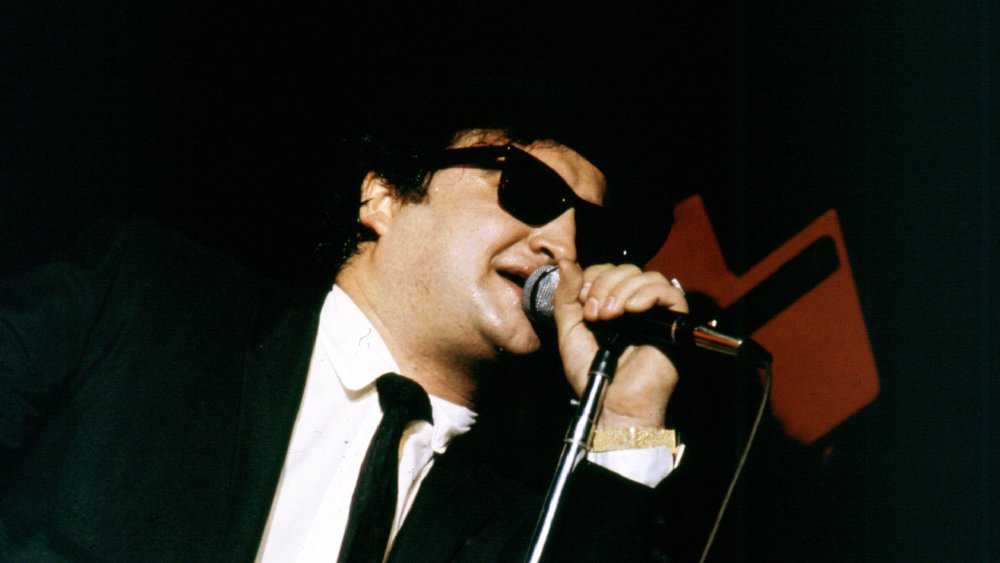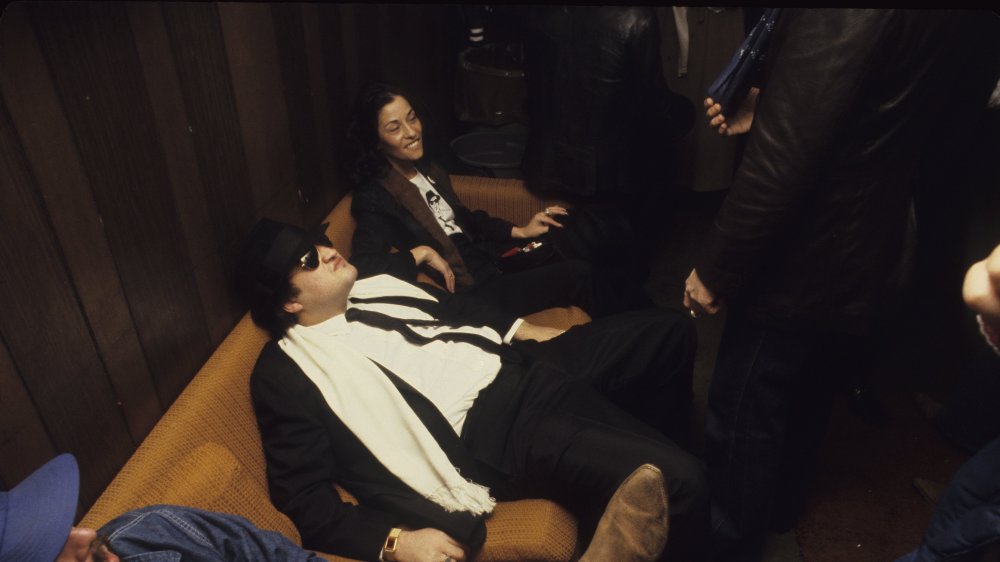What The Last 12 Months Of John Belushi's Life Were Like
The half-life of the public's adulation is astonishingly brief. All in all, it took roughly a decade for John Belushi's life to travel the parabola of fame. In 1972, he graduated from Chicago-area improv to National Lampoon off-broadway productions and recording work. In 1975, he broke big with NBC's Saturday Night, SNL's larval form. His Jake Blues persona cracked the Billboard Top 20 in 1978 with "Soul Man," and in 1980, he brought the character to the big screen in Blues Brothers which, along with Animal House, cemented his place as a Hollywood legend. Less than two years after the release of Blues Brothers and a day before he died, on March 4th of 1982, Belushi made two separate visits to his manager, asking if he could borrow $1,500.
Macabre? Yes, and it illustrates the almost unfathomably tight U-turn that Belushi's life took during his final months. It wasn't just about the ubiquitous "live fast, die young" mythos that surrounds the actor today. Life as a human cannonball of excess wasn't the only factor in Belushi's passing; losing the public's attention played an undeniable role. Once everyone else has gone home, it's not a party anymore, it's just you in a room getting wasted. Belushi, by all appearances, wasn't prepared for how quickly the audience would want to go home.
With all of the mythos surrounding him today, it's easy to forget that John Belushi's career was astonishingly hit and miss in the years surrounding his SNL exodus. Animal House received mixed reviews upon its release. 1941 was received even less fondly. The 1981 comedies Continental Divide and Neighbors never got much mileage, and Belushi's first and only big screen shot at a drama, 1979's Old Boyfriends, is as forgotten today as it was overlooked when it came out. In short, the guy seemed to be struggling to maintain the fan base that had rocketed him to superstardom just a few years prior.
John Belushi: a life of extremes
Following a one-two punch of box office disappointments in 1981, John Belushi was eager to get back on track with a new movie, but there were problems. The production of Neighbors had ended the actor's brief attempt at sobriety, and studios weren't warming up to his latest passion project, a comedy entitled Noble Rot. Paramount had already rejected the script, requesting that he work on a new National Lampoon project, The Joy of Sex, instead. "He couldn't believe they wouldn't take his screenplay," Belushi's dealer Catherine Smith told Rolling Stone after the fact, "but that they wanted him to do this movie about a little boy born into a porno family, a family making porno flicks." This, his friends said, was what set the comic off on a remarkable binge. "He was unhappy that Paramount didn't jump up and down over the script," said his longtime manager Bernie Brillstein. "John was a very definite guy. He wanted immediate approval."
With a multimillion-dollar deal on the line and the studio's disapproval hanging over his head, John Belushi checked into a $200 a day bungalow on the Sunset Strip on February 28th, 1982. According to Biography, it didn't take long before the place was trashed. "Belushi's attention span was limited and his speech often incoherent," they stated, continuing, "his clothes were dirty and he appeared unbathed, his bungalow was in a constant state of disarray."
The rental became a regular hangout for Hollywood celebrities after the bars closed, with guests like Robin Williams, Harry Dean Stanton, and Robert De Niro stopping by in the hours before Belushi's death. But among the most frequent visitors was Catherine Smith, the woman who would later plead guilty to administering the speedball that killed the comic. The circumstances surrounding John Belushi's passing, in conjunction with his most recognizable roles, has made him synonymous with a constant bacchanalian lifestyle. His widow, Judy, described him in a different light, speaking to The Guardian about "his courage to forge the life he dreamed in an unfamiliar landscape, his dedication to his craft, his epic friendships, and loving temperament." To this day, he's still missed.

